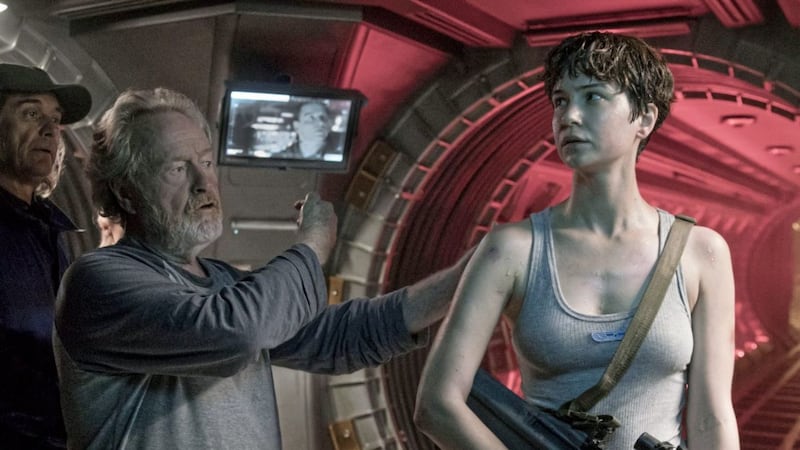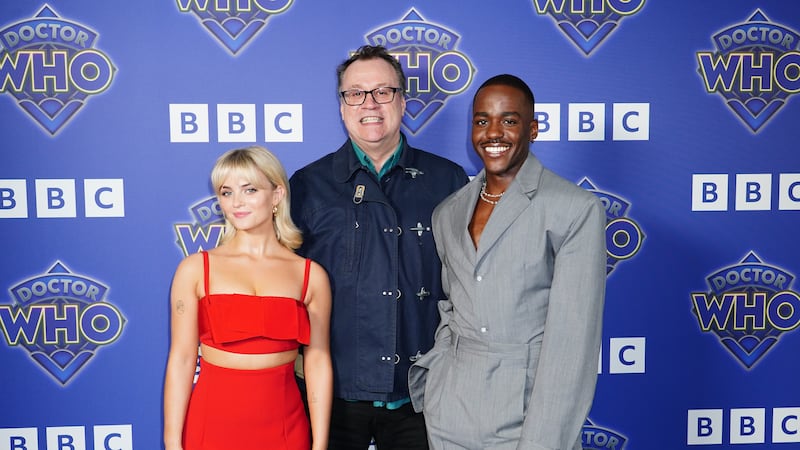IN ALIEN'S terrifying Xenomorph, Sir Ridley Scott believes he introduced "maybe the definitive monster in film history".
"I can say that because I just spotted it but I didn't [create it]. That was [surrealist] HR Giger," says the 79-year-old film-maker, the man responsible for inducing nightmares with his depiction of chest-bursting aliens, but who doesn't scare easily himself.
Not things that go bump in the night – "nothing" – says the man credited with producing more than 100 projects and directing 49, including feature films Blade Runner, Thelma And Louise and Gladiator.
As he puts it, his line of work doesn't allow for a jumpy demeanour, but rather, a calm and clear head.
"When I do my job, I walk on to the floor in the morning and there can be 400 people standing there who all turn and say, 'What are you going to do?' So when you deal with that, it [everything else] becomes easy."
Alien, which was released in 1979 and marked Sigourney Weaver's debut as the heroic Ellen Ripley, spawned three further movies (Aliens, Alien 3 and Alien: Resurrection), as well as the spin-off Alien vs. Predator franchise, although none of these were directed by Scott.
The British film-maker only returned to this futuristic universe for 2012's Prometheus, a prequel of sorts to Alien.
"Prometheus was, if you like, the process of bringing the thing back to life because I thought it had died," explains the father-of-three.
He figured "it was a great pity to lose him", referring to the iconic Alien, but felt this particular monster was thoroughly "cooked".
"And then starting again [with Prometheus] was very successful, and the subtext was they [the public] had missed him."
While some people criticised Prometheus for lacking scares, the same cannot be said for Alien: Covenant, although Scott is keen not to repeat himself.
"You can't keep being chased down a corridor by a monster – it gets boring," he declares. "It came to me that no-one had asked the question, 'Who made this and why?'"
Set 10 years after the events of Prometheus, the film opens with the crew and 2,000 passengers in a state of cryosleep aboard the spaceship Covenant, as they head to a new planet intending to establish a new colony.
When a stellar ignition rips through the ship, Walter – a synthetic played by Michael Fassbender, who also reprises his role of David, the synthetic from Prometheus – is forced to wake the crew. While the ship is being fixed, a distress call from a nearby planet is detected, which sets them on an unexpected mission, one they're going to regret.
Scott and his team had to decide whether to bring the Alien back or invent something else for this latest instalment.
They decided to do both and the Neomorph was born.
"Designing the Neomorph was tough," says Scott, who used Giger's work, combined with a deep-sea predator, the goblin shark, as inspiration.
"It was a big challenge, because I had to have something in addition to the usual suspect. I didn't want that to wear [him] out, I wanted to save him. The Neomorph, in a way, is the first generation of an alien but it needs a human life from to cop on to and, if you like, mix with, copulate with."
Back in 1979, spindly Nigerian artist Bolaji Badejo wore "a tight suit and hat" to depict the Alien.
"Digitally, you can do what you want now but you have to be careful, because when it's digital, people kind of smell it, they can sense it," says Scott. "You've got to make sure digital doesn't thin out the fear of the real thing. People sense the real thing."
He also credits the actors, particularly Fantastic Beasts And Where To Find Them's Katherine Waterston and Billy Crudup, for instilling a real sense of trepidation and terror.
"Both Katherine and Billy come from the theatre, and they very much brought their technique, their knowledge, their sensitivity. When you're doing a film like this, with people dying constantly and under great duress, there must be a constant show of fear.
"There are many colours of fear, many colours of remorse. A person who has a theatre background, they dig deep and can pull that out."
Scott won't, or perhaps can't, confirm how many more Alien films there might be.
"No, how many more Star Wars are there? And I think we're becoming as valid as Star Wars," he says.
He hopes to reintroduce Weaver at some point, a possibility given the 67-year-old actress could be 'de-aged' digitally.
"Sigourney [her character] at the time of this film isn't born yet, so yes, we're going to come in towards the back, which is the first Alien," explains Scott, who would love to bring the franchise full circle.
"Certainly. I've changed gear. Back when it all began, I didn't ever want to think about doing sequels but now I think there is a value to that, particularly when he [the Alien] is that good and he kind of died too soon."
Scott turns 80 in November but retirement isn't on his radar, with a raft of work already pencilled in, including Battle Of Britain, a second series of Taboo starring Tom Hardy, and All The Money In The World, which he starts shooting in three weeks' time.
"People do five [films] in their lifetime and I go, 'What have you been doing?'" laughs Scott, who won't be marking his landmark birthday with a party.
"I've not celebrated a birthday for 20 years. I ignore it and woe betide anyone who reminds me," he says with a grin.
:: Alien: Covenant is in cinemas from Friday May 12








